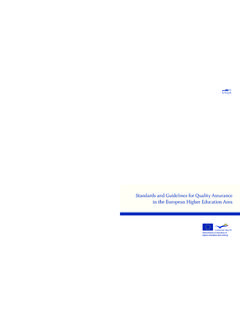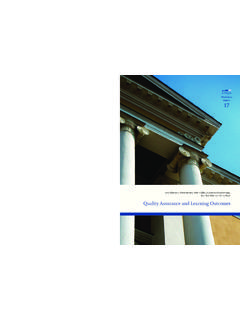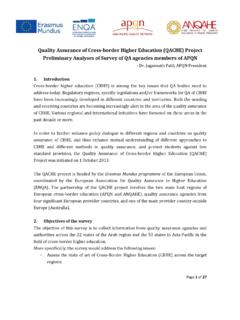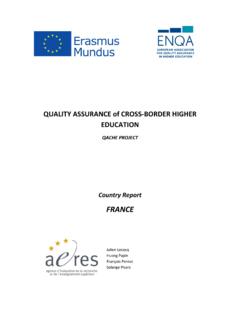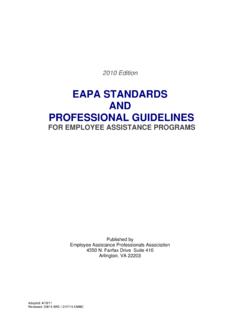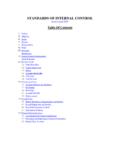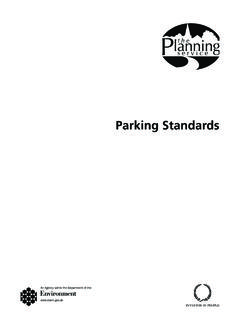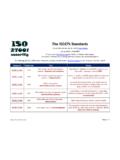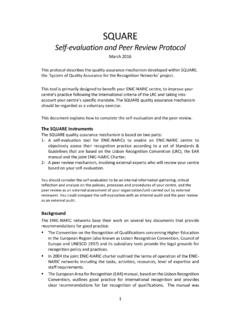Transcription of ESG - ENQA
1 standards and guidelines for Quality Assurance in the European Higher Education AreaThe standards and guidelines for Quality Assurance in the European Higher Education Area, also known as the European standards and guidelines or ESG, are the basis for quality assurance in the European Higher Education Area (EHEA). They are one of the main achievements of the Bologna Process and its follow-up structure, the Bologna Follow-Up Group (BFUG) in the past 2015 standards and guidelines for Quality Assurance in the European Higher Education Area (ESG)ISBN: 978-9-08-168672-3 Legal deposit: D/2015 :European Association for Quality Assurance in Higher Education (ENQA)European Students Union (ESU)European University Association (EUA)European Association of Institutions in Higher Education (EURASHE)In cooperation with:Education International (EI)BUSINESSEUROPEE uropean Quality Assurance Register for Higher Education (EQAR)Design & Publication:by EURASHE, on behalf of the authors.
2 Brussels, Belgium. 2015 This work is licensed under the Creative Commons Attribution-NonCommercial-ShareAlike International License. To view a copy of this license, visit with the support of the EU-funded EQUIP EQUIP project, is an EU-funded project, that aims at Enhancing Quality through Innovative Policy & Practice in European higher education by promoting the consistent, efficient and innovative embedding of the ESG at grass-root level. The EQUIP partners are EURASHE, ENQA, EUA, ESU, EI Research Institute, EQAR, UiO IPED and European Commission support for the production of this publication does not constitute an endorsement of the contents which reflects the views only of the authors, and the Commission cannot be held responsi ble for any use which may be made of the information contained cite this publication as: standards and guidelines for Quality Assurance in the European Higher Education Area (ESG).
3 (2015). Brussels, of ConTenTsforeword 5I ConTexT, sCope, purposes and prInCIples 6 Setting the context 6 Scope and conceptS 6eSg: purpoSeS and principleS 7II european standards and guidelines for qualITy assuranCe In hIgher eduCaTIon 9part 1: standards and guidelines for internal quality aSSurance 10part 2: standards and guidelines for external quality aSSurance 17part 3: standards and guidelines for quality aSSurance agencieS 21 III annex.
4 Summary lIsT of standards 255forewordThe standards and guidelines for Quality Assurance in the European Higher Education Area (ESG) were adopted by the Ministers responsible for higher education in 2005 following a proposal prepared by the European Association for Quality Assurance in Higher Education (ENQA) in co-operation with the European Students Union (ESU),1 the European Association of Institutions in Higher Education (EURASHE) and the European University Association (EUA). Since 2005, considerable progress has been made in quality assurance as well as in other Bologna action lines such as qualifications frameworks, recognition and the promotion of the use of learning outcomes, all these contributing to a paradigm shift towards student-centred learning and this changing context, in 2012 the Ministerial Communiqu invited the E4 Group (ENQA, ESU, EUA, EURASHE) in cooperation with Education International (EI), BUSINESSEUROPE and the European Quality Assurance Register for Higher Education (EQAR) to prepare an initial proposal for a revised ESG to improve their clarity, applicability and usefulness, including their scope.
5 The revision included several consultation rounds involving both the key stakeholder organisations and ministries. The many comments, proposals and recommendations received were carefully analysed and taken very seriously by the Steering Group (SG). They are reflected in this 2015 version of the ESG. The ESG 2015 were adopted by the Ministers responsible for higher education in the European Higher Education Area in May 2015. As a result of the participative revision we are confident that they reflect a consensus among all the organisations and ministries involved on how to take forward quality assurance in the European Higher Education Area and, as such, provide a firm basis for successful Association for Quality Assurance in Higher Education (ENQA)European Students Union (ESU)European University Association (EUA) European Association of Institutions in Higher Education (EURASHE)In cooperation with: Education International (EI) BUSINESSEUROPEE uropean Quality Assurance Register for Higher Education (EQAR)1 ESU was formerly known as ESIB The National Unions of Students in ConTexT, sCope, purposes and prInCIplesseTTIng The ConTexTHigher education, research and innovation play a crucial role in supporting social cohesion, economic growth and global competitiveness.
6 Given the desire for European societies to become increasingly knowledge-based, higher education is an essential component of socio-economic and cultural development. At the same time, an increasing demand for skills and competences requires higher education to respond in new ways. Broader access to higher education is an opportunity for higher education institutions to make use of increasingly diverse individual experiences. Responding to diversity and growing expectations for higher education requires a fundamental shift in its provision; it requires a more student-centred approach to learning and teaching, embracing flexible learning paths and recognising competences gained outside formal curricula. Higher education institutions themselves also become more diverse in their missions, mode of educational provision and cooperation, including growth of internationalisation, digital learning and new forms of The role of quality assurance is crucial in supporting higher education systems and institutions in responding to these changes while ensuring the qualifications achieved by students and their experience of higher education remain at the forefront of institutional key goal of the standards and guidelines for Quality Assurance in the European Higher Education Area (ESG)
7 Is to contribute to the common understanding of quality assurance for learning and teaching across borders and among all They have played and will continue to play an important role in the development of national and institutional quality assurance systems across the European Higher Education Area (EHEA) and cross-border cooperation. Engagement with quality assurance processes, particularly the external ones, allows European higher education systems to demonstrate quality and increase transparency, thus helping to build mutual trust and better recognition of their qualifications, programmes4 and other ESG are used by institutions and quality assurance agencies as a reference document for internal and external quality assurance systems in higher education. Moreover, they are used by the European Quality Assurance Register (EQAR), which is responsible for the register of quality assurance agencies that comply with the ESG.
8 SCope and ConCepTsThe ESG are a set of standards and guidelines for internal and external quality assurance in higher education. The ESG are not standards for quality, nor do they prescribe how the quality assurance processes are implemented, but they provide guidance, covering the areas which are vital for successful quality provision and learning environments in higher education. The ESG should be considered in a broader context that also includes qualifications frameworks, ECTS and diploma supplement that also contribute to promoting the transparency and mutual trust in higher education in the Communication from the European Commission: Opening up Education: Innovative teaching and learning for all through new Technologies and Open Educational Resources, COM(2013) 654 final, Unless otherwise specified, in the document stakeholders are understood to cover all actors within an institution, including students and staff, as well as external stakeholders such as employers and external partners of an The term programme in these standards refers to higher education provision in its broadest sense, including provision that is not part of a programme leading to a formal focus of the ESG is on quality assurance related to learning and teaching in higher education, including the learning environment and relevant links to research and innovation.
9 In addition institutions have policies and processes to ensure and improve the quality of their other activities, such as research and ESG apply to all higher education offered in the EHEA regardless of the mode of study or place of delivery. Thus, the ESG are also applicable to all higher education including transnational and cross-border provision. In this document the term programme refers to higher education in its broadest sense, including that which is not part of a programme leading to a formal degree. Higher education aims to fulfil multiple purposes; including preparing students for active citizenship, for their future careers ( contributing to their employability), supporting their personal development, creating a broad advanced knowledge base and stimulating research and Therefore, stakeholders, who may prioritise different purposes, can view quality in higher education differently and quality assurance needs to take into account these different perspectives.
10 Quality, whilst not easy to define, is mainly a result of the interaction between teachers, students and the institutional learning environment. Quality assurance should ensure a learning environment in which the content of programmes, learning opportunities and facilities are fit for the heart of all quality assurance activities are the twin purposes of accountability and enhancement. Taken together, these create trust in the higher education institution s performance. A successfully implemented quality assurance system will provide information to assure the higher education institution and the public of the quality of the higher education institution s activities (accountability) as well as provide advice and recommendations on how it might improve what it is doing (enhancement). Quality assurance and quality enhancement are thus inter-related.
